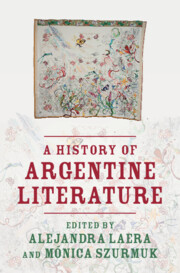Book contents
- A History of Argentine Literature
- A History of Argentine Literature
- Copyright page
- Contents
- Figures
- Contributors
- Editors’ Acknowledgments
- Introduction
- Part I Literary Dates
- Chapter 1 1536: The Creation of a Literary Space
- Chapter 2 1810: Patriotic Voices
- Chapter 3 1837: The Foundation of a National Literature
- Chapter 4 1884: A Literary Field in Formation
- Chapter 5 1910: A Modern Lettered City
- Chapter 6 1926: Traditions Old and New
- Chapter 7 1948: Culture and the State
- Chapter 8 1963: Experimentation and the Common Reader
- Chapter 9 1980: Memory and the Novel
- Chapter 10 2001: Argentine Narrative in the New Millennium
- Part II Critical Inroads
- Part III Literary Names
- Index
- References
Chapter 9 - 1980: Memory and the Novel
from Part I - Literary Dates
Published online by Cambridge University Press: 09 May 2024
- A History of Argentine Literature
- A History of Argentine Literature
- Copyright page
- Contents
- Figures
- Contributors
- Editors’ Acknowledgments
- Introduction
- Part I Literary Dates
- Chapter 1 1536: The Creation of a Literary Space
- Chapter 2 1810: Patriotic Voices
- Chapter 3 1837: The Foundation of a National Literature
- Chapter 4 1884: A Literary Field in Formation
- Chapter 5 1910: A Modern Lettered City
- Chapter 6 1926: Traditions Old and New
- Chapter 7 1948: Culture and the State
- Chapter 8 1963: Experimentation and the Common Reader
- Chapter 9 1980: Memory and the Novel
- Chapter 10 2001: Argentine Narrative in the New Millennium
- Part II Critical Inroads
- Part III Literary Names
- Index
- References
Summary
This chapter maps out two decades of novelistic production starting with Respiración artificial by Ricardo Piglia in the midst of the dictatorship. An archival pursuit of a history of violence constitutive of national foundations, the narrative insinuates the possibility of a national project where silenced voices might have a hearing. Whereas in Piglia, modernist fragmentation signals an enigma that needs to be solved, in Reina Roffe’s La rompiente a shattered and disrupted memory both names the horror and promises a break away from archival sites of authority. Los Pichiciegos by Rodolfo Fogwill offers a vision of the Malvinas/Falklands War that is both hallucinatory and hyperreal, facing simultaneously the darkness of the present and a visionary glance revealing novel forms of destitution in the making. In novels published in the 1990s such as Matilde Sanchez’s El dock, Rodolfo Fogwill’s Vivir afuera, Sergio Chefjec’s El aire and Los planetas, the characters’ aimless wanderings might be said to explore the failure of memory as historical direction, as national reckoning, as a form of political representation, as harnessing community, yet memories of the horror persist beyond any general project of political reconstitution and the capacity of literature to repair or bestow meaning.
- Type
- Chapter
- Information
- A History of Argentine Literature , pp. 133 - 146Publisher: Cambridge University PressPrint publication year: 2024

